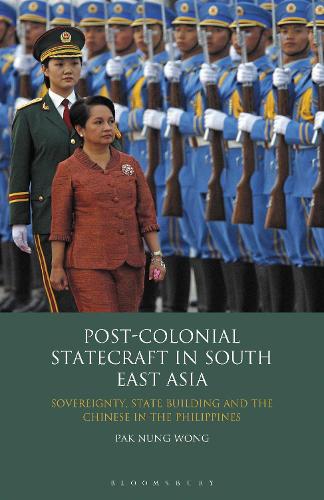
Post-Colonial Statecraft in South East Asia: Sovereignty, State Building and the Chinese in the Philippines
(Hardback)
Available Formats
Publishing Details
Post-Colonial Statecraft in South East Asia: Sovereignty, State Building and the Chinese in the Philippines
By (Author) Dr Pak Nung Wong
Bloomsbury Publishing PLC
I.B. Tauris
30th November 2012
United Kingdom
Classifications
Tertiary Education
Non Fiction
International relations
320.95991
Physical Properties
Hardback
360
Width 138mm, Height 216mm
601g
Description
Stretched out along the Western rim of the Pacific, historically torn between Chinese and US influence, the Philippines has been troubled by internal conflicts since its independence in 1946. In 1972, following two decades of communist insurgency and social unrest, President Ferdinand Marcos imposed martial law and established a 14-year dictatorship. Although Marcos was overthrown in 1986, the democracy that followed, as in many South-East Asian states, has been beleaguered by insurgency, mutiny, corruption and violence.
An incisive and historically informed ethnography of the region, Post-Colonial Statecraft in South East Asia, accounts for centralizing measures by the state and the resistance that it encounters when policing the frontiers. As the first study of its kind, and the result of several years of field research, Pak Nung Wong maps out the complex interweaving power structures of the tribal rulers in the northern regions of the Philippines.
Featuring interviews with a range of local actors, including state officials, members of the judiciary, the police force, the Catholic Church, the military, the Chinese business community and the inarticulate ruled majority, Post-Colonial Statecraft in South East Asia provides a complete picture of Philippine political culture. By focusing on the governance techniques of three frontier strongmen of the Cagayan Valley; the late Lieutenant Colonel Rodolfo Aguinaldo, Dr Manuel Mamba of Tuao and Mr Delfin Ting of Tuguegarao City, the book argues that the success of Philippine post-colonial statecraft hinges on the integration of the provinces into the state's mechanisms of power.
Reviews
'Post-Colonial Statecraft in South-East Asia does not refrain from debating issues with proponents of divergent schools of thought. This is a very significant book not only for Southeast Asia but also for students of China and its diaspora.' Jerzy Bayer, Ambassador of the Republic of Poland to Thailand, Cambodia, Laos and Myanmar 'This book is a real gem. In crossing time and space, cultures and disciplines, as well as levels of analysis, the author pieces together a convincing argument that the Philippine government was able to contain, co-opt, and change the strongmen of the frontier provinces in upholding the country's sovereignty in the post-colonial era. As a meticulous researcher and master narrator, Dr. Wong has successfully tackled a serious ethno-political issue in a comparative light, while allowing time to discuss cock fights, pinball machines, and the mysterious death of Leonardo Mamba.' Gerald Chan, Chair & Professor of Political Studies, University of Auckland, New Zealand 'This signal book shows the intricacies and suggests the complexities of the long colonial history of the Philippines since the first arrival of the Spanish through the foundation of Manilla, the Spanish-American civil war of 1898 when the Philippines moved to the hand of the US and the period of dictatorship. Pak Nung indirectly shows the limit of European theories to deal with state formation after independence. States in ex-Euro- American colonies have to be creative to find their own political theories in decolonizing the European idea of the state.' Walter D. Mignolo, Director of the Center
Author Bio
Pak Nung Wong is Assistant Professor in the Department of Applied Social Studies at the City University of Hong Kong. He holds a D.Phil in Social and Cultural Anthropology from St. Antony's College, Oxford.
